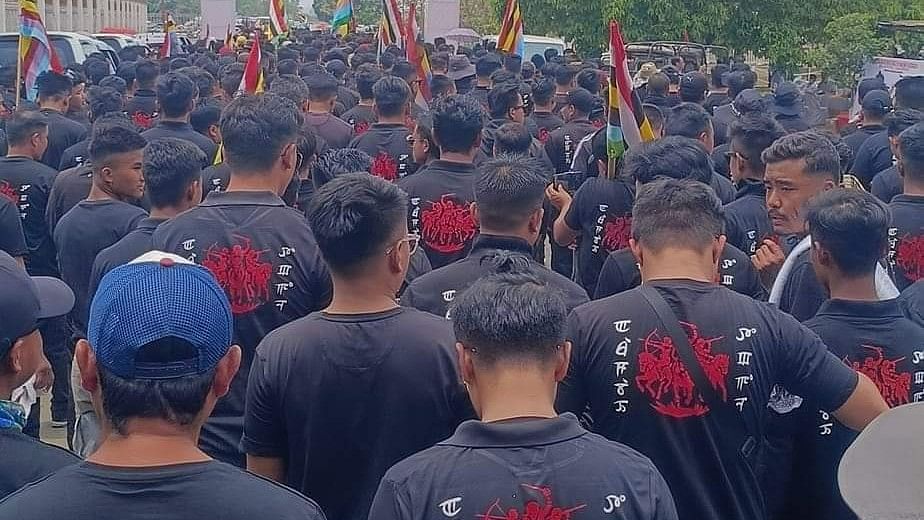
Cadres of Arambai Tenggol in uniform.
Credit: Special arrangement
Guwahati: They came into being between 2015 and 2020 with almost similar goals--protecting culture of the majority Meitei community and reviving Sanamahi, the ethnic religion largely practised in Manipur in the past.
But the ethnic clash between the Meiteis and the Kuki tribes since May last year saw Arambai Tenggol and Meitei Leepun, two radical Meitei organisations, turn into "armed groups" with Kuki organisations alleging their role in snatching of weapons from government armouries and leading "ethnic cleansing" against the Kukis.
While Kuki groups' allegations about attacks on their villages by the two radical groups during the riot was not accepted by many Meitei organisations, the power and their growing clout was out in the open in the state capital Imphal on January 24.
Arambai Tenggol "summoned" all 40 MLAs and two MPs representing the Meitei-dominated Imphal Valley to the historic Kangla Fort and got 37 legislators and the two MPs to "take oath" for fulfilling its charter of demands that would eventually go against the Kukis. After the meeting, Arambai Tenggol chief Korounganba Lhuman told a crowd that the legislators including CM N. Biren Singh and former CM Okram Ibobi Singh signed to endorse their "charter of demands." The demands included delisting the Kukis from the list of Scheduled Tribe (ST), a NRC to detect "foreigners" (Kukis) and abrogation of the Suspension of Operation agreement with the Kuki insurgent groups.
Next day, Congress claimed that three MLAs including its state unit president, K. Meghachandra were physically assaulted as they reportedly blamed the BJP government's failure to end the violence in Manipur. The group served a 15-days deadline to take up their demands with the Centre, failing which they threatened to take "appropriate steps."
This provided the Kuki groups more reasons to again charge that the two Meitei radical groups enjoyed "patronage" of CM N. Biren Singh, also a Meitei, and that they were being assisted to carry out "ethnic cleansing" of the Kuki-Zo people. "This Taliban- like act of Arambai Tenggol shows the total breakdown of the Indian Constitutional machineries in Manipur valley. Such instances of militia taking over the streets despite the presence of democratically elected popular government is unprecedented in Independent India," 10 MLAs belonging to Kuki-Zo people said in a letter to PM Narendra Modi on Monday.
Kuki groups allege that cadres of Arambai Tenggol and Meitei Leepun were even accompanied by Manipur police commandos while carrying out attacks on Kuki villages. More than 200 people have been killed and over 50,000 others have been displaced due to the attacks by both the Meitei and the Kukis.
Origin and strength:
Formed in 2020, Arambai Tenggol at present has several units comprising nearly 50,000 cadres. Members of the group wear a uniform with black T-shirts bearing a red insignia of three horsemen charging into battle. The Facebook profile of its chief, Korounganba Lhuman shows Tenggol members moving with sophisticated weapons and carrying out "operations" against the Kukis. Meiteis claim that "illegal migration" of the Kukis from neighbouring Myanmar has posed a threat to the Meiteis and forests in Manipur. Manipur's lone Rajya Sabha MP Leishemba Sanajaoba, also the state's titular king, reportedly acted as its advisor.
Meitie Leepun, formed in 2015, is now led by Pramot Singh, who studied clinical psychology from a Gujarat-based University. The group, which is less radicalised, compared to Arambai Tenggol, is said to be influenced by RSS-affiliated Akhil Bhartaiya Vidyarthi Parishad. He even admitted in public that members of Meitei Leepun are provided arms training to 'defend' the Meiteis. The group has about 1,500 members.
Challenge to peace:
As Kuki groups constantly blamed the Arambai Tenggol and Meetei Leepun for the attacks, CM Biren Singh only appealed to all armed groups to desist from violence, without taking names of the two radical groups. Singh, however, at the same time made claims about involvement of insurgents based out in Myanmar, a claim made by the Meitei organisations including the two radical groups.
At least three Meitei intellectuals in Imphal DH spoke to on Tuesday, refused to talk about the Arambai Tenggol and Meitei Leepun fearing "action" given the growing clout and power of the two radical groups. Requesting anonymity, one activist said, One activist said, "They have been an armed group for sometime, what they have become now is a supra government above the elected people's representatives, which is dangerous."
Another Meitei activist said that the two radical groups took up the cudgel as the government and the central security forces failed to act against the "narco Kuki terrorists" operating with the help from elements based in Myanmar.
Kukis gear up:
As the clout of Arambai Tenggol and Meitei Leepun grows, Kuki groups are strengthening their "village volunteers" to "defend" the Kukis from possible attacks. Sporadic incidents of firing have continued between the Meitei armed groups and the "village volunteers" along the "buffer zone" created by the central security forces to divide the Imphal Valley from the Kuki-dominated hills and prevent further escalation of the conflict. Questions have also been raised over the sophisticated weapons found in possession of the Kuki groups. Meiteis have alleged involvement of the Kuki insurgent groups in drugs smuggling and violence.